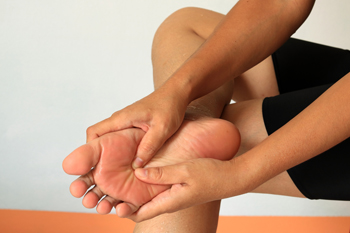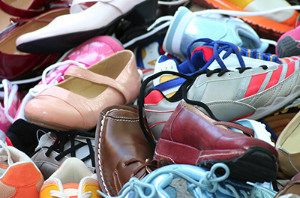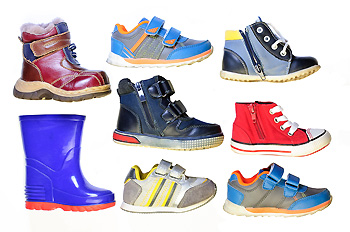Items filtered by date: May 2021
How Diabetes Can Affect the Feet
It is well known that diabetes affects blood sugar and one’s overall health, but did you know that it can affect your feet too? Diabetes can cause peripheral neuropathy, a type of nerve damage in the feet that can lead to a loss of sensation. Diabetes also affects blood flow throughout the body and often leads to poor blood flow to the feet. Neuropathy can make it difficult to detect foot injuries, such as sores, scrapes, or wounds, and poor circulation can make these injuries slow to heal and prone to infection. When left untreated serious complications may occur. Signs that diabetes is affecting your feet include foot swelling, discoloration, burning or tingling sensations, numbness, and loss of hair on the toes and legs. If you have diabetes or notice any of these symptoms in your feet, it is suggested that you seek the care of a podiatrist who can help you manage proper foot health.
Diabetic foot care is important in preventing foot ailments such as ulcers. If you are suffering from diabetes or have any other concerns about your feet, contact Dr. Barbara Davis from Gilbert Podiatry. Our doctor can provide the care you need to keep you pain-free and on your feet.
Diabetic Foot Care
Diabetes affects millions of people every year. The condition can damage blood vessels in many parts of the body, especially the feet. Because of this, taking care of your feet is essential if you have diabetes, and having a podiatrist help monitor your foot health is highly recommended.
The Importance of Caring for Your Feet
- Routinely inspect your feet for bruises or sores.
- Wear socks that fit your feet comfortably.
- Wear comfortable shoes that provide adequate support.
Patients with diabetes should have their doctor monitor their blood levels, as blood sugar levels play such a huge role in diabetic care. Monitoring these levels on a regular basis is highly advised.
It is always best to inform your healthcare professional of any concerns you may have regarding your feet, especially for diabetic patients. Early treatment and routine foot examinations are keys to maintaining proper health, especially because severe complications can arise if proper treatment is not applied.
If you have any questions please feel free to contact our office located in Gilbert, PA . We offer the newest diagnostic and treatment technologies for all your foot and ankle needs.
What to Do if You Have Morton's Neuroma
Morton’s neuroma is a condition in which the nerve tissue located in the ball of the foot, between the toes, becomes inflamed. This causes symptoms such as sharp pain in the bottom of the foot, tingling, burning, numbness, or the sensation that you are walking on a pebble or that something is stuck in the ball of your foot. Morton’s neuroma can often fully resolve with conservative treatments such as resting and icing the foot, wearing wide and comfortable shoes, wearing orthotic inserts, and taking over the counter medications to reduce pain. Your podiatrist can also relieve Morton’s neuroma pain by injecting cortisone directly into the foot. In rare cases, symptoms may be persistent and could require surgical intervention. Consult with a podiatrist to find out which treatment method would be best for you.
Morton’s neuroma is a very uncomfortable condition to live with. If you think you have Morton’s neuroma, contact Dr. Barbara Davis of Gilbert Podiatry. Our doctor will attend to all of your foot care needs and answer any of your related questions.
Morton’s Neuroma
Morton's neuroma is a painful foot condition that commonly affects the areas between the second and third or third and fourth toe, although other areas of the foot are also susceptible. Morton’s neuroma is caused by an inflamed nerve in the foot that is being squeezed and aggravated by surrounding bones.
What Increases the Chances of Having Morton’s Neuroma?
- Ill-fitting high heels or shoes that add pressure to the toe or foot
- Jogging, running or any sport that involves constant impact to the foot
- Flat feet, bunions, and any other foot deformities
Morton’s neuroma is a very treatable condition. Orthotics and shoe inserts can often be used to alleviate the pain on the forefront of the feet. In more severe cases, corticosteroids can also be prescribed. In order to figure out the best treatment for your neuroma, it’s recommended to seek the care of a podiatrist who can diagnose your condition and provide different treatment options.
If you have any questions, please feel free to contact our office located in Gilbert, PA . We offer the newest diagnostic and treatment technologies for all your foot care needs.
How Shoes Affect Your Plantar Fascia
The connective tissue on the bottom of your feet between your heel and toes is called the plantar fascia. That tissue can become aggravated from overuse, wearing high heels or shoes that change the shape of your foot when you walk, being obese, aging, having certain medical conditions, or being born with flat feet or high arches. This aggravation is called plantar fasciitis, and is the most common form of heel pain. Proper footwear may help avoid plantar fasciitis or reduce pain if it has already developed. Your shoes should allow the natural movement of your foot, and have cushioning that supports pressure points—especially the heel, while being flexible and offering proper arch support. A podiatrist can recommend shoes and even orthotics that can help your individual foot structure, while offering various treatments to relieve the pain and discomfort of plantar fasciitis.
It is important to find shoes that fit you properly in order to avoid a variety of different foot problems. For more information about treatment, contact Dr. Barbara Davis from Gilbert Podiatry. Our doctor will treat your foot and ankle needs.
Proper Shoe Fitting
Shoes have many different functions. They cushion our body weight, protect our feet, and allow us to safely play sports. You should always make sure that the shoes you wear fit you properly in order to avoid injuries and deformities such as: bunions, corns, calluses, hammertoes, plantar fasciitis, stress fractures, and more. It is important to note that although a certain pair of shoes might be a great fit for someone else, that doesn’t mean they will be a great fit for you. This is why you should always try on shoes before buying them to make sure they are worth the investment. Typically, shoes need to be replaced ever six months to one year of regular use.
Tips for Proper Shoe Fitting
- Select a shoe that is shaped like your foot
- Don’t buy shoes that fit too tight, expecting them to stretch to fit
- Make sure there is enough space (3/8” to ½”) for your longest toe at the end of each shoe when you are standing up
- Walk in the shoes to make sure they fit and feel right
- Don’t select shoes by the size marked inside the shoe, but by how the shoe fits your foot
The shoes you buy should always feel as good as they look. Shoes that fit properly will last longer, feel better, and improve your way of life each day.
If you have any questions, please feel free to contact our office located in Gilbert, PA . We offer the newest diagnostic and treatment technologies for all your foot care needs.
When Should I Get My Child New Shoes?
Children's feet grow and change quite rapidly throughout childhood. It is very important to make sure that your child is wearing the right shoes to protect their feet, as well as prevent foot pain and injuries. Since children’s feet tend to grow quickly, it can be difficult to determine whether your child needs new shoes. After all, you just bought a new pair two months ago - could your child have outgrown them already? You should look for new shoes if your child can no longer fit their foot comfortably or wiggle their toes within their current shoes. New shoes should also be purchased if the sole of the shoe is broken or torn as well as if your child is limping or if you notice a different walking pattern. To learn more about the connections between footwear and your child’s foot health, please speak with a podiatrist.
Making sure that your children maintain good foot health is very important as they grow. If you have any questions, contact Dr. Barbara Davis of Gilbert Podiatry. Our doctor can provide the care you need to keep you pain-free and on your feet.
Keeping Children's Feet Healthy
Having healthy feet during childhood can help prevent medical problems later in life, namely in the back and legs. As children grow, their feet require different types of care. Here are some things to consider...
Although babies do not walk yet, it is still very important to take care of their feet.
Avoid putting tight shoes or socks on his or her feet.
Allow the baby to stretch and kick his or her feet to feel comfortable.
As a toddler, kids are now on the move and begin to develop differently. At this age, toddlers are getting a feel for walking, so don’t be alarmed if your toddler is unsteady or ‘walks funny’.
As your child gets older, it is important to teach them how to take care of their feet.
Show them proper hygiene to prevent infections such as fungus.
Be watchful for any pain or injury.
Have all injuries checked by a doctor as soon as possible.
Comfortable, protective shoes should always be worn, especially at play.
If you have any questions please feel free to contact our office located in Gilbert, PA . We offer the newest diagnostic and treatment technologies for all your foot and ankle needs.





